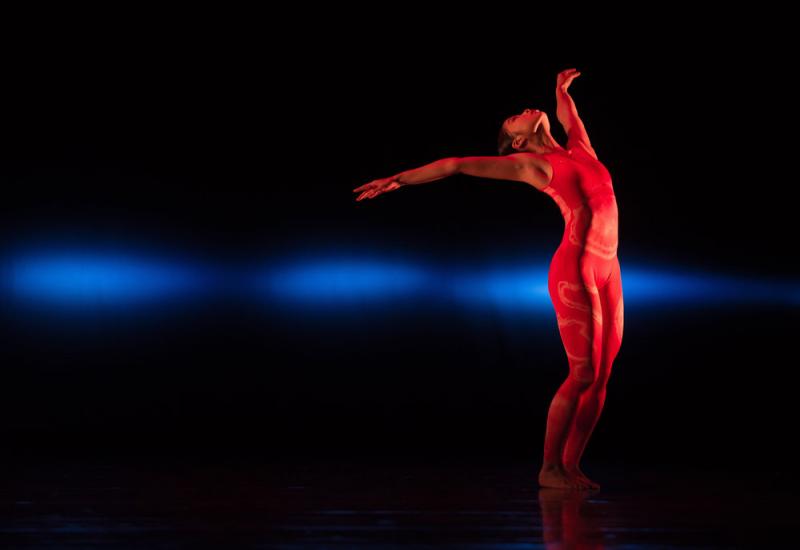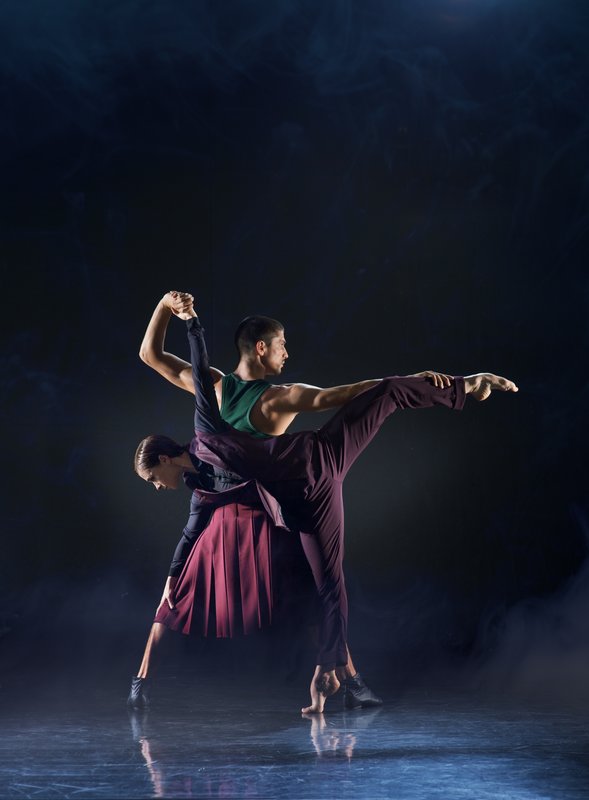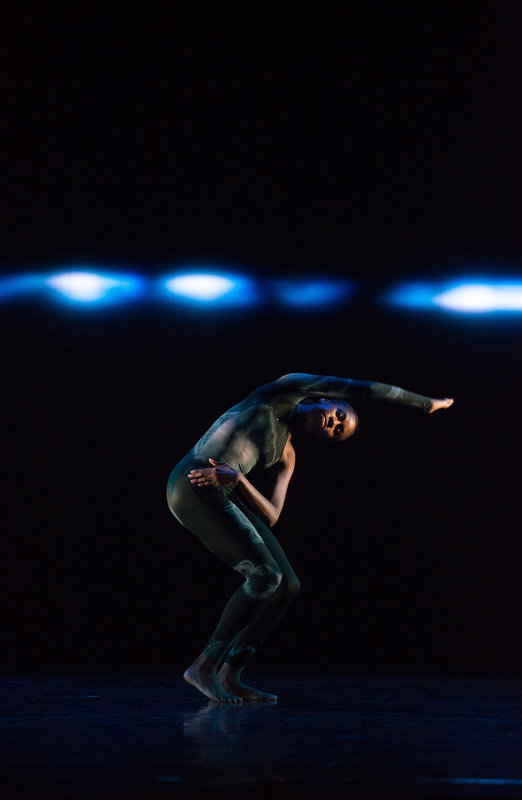Triptych, Rambert, Sadler's Wells | reviews, news & interviews
Triptych, Rambert, Sadler's Wells
Triptych, Rambert, Sadler's Wells
Great dancers in long programme of new work by Baldwin, Jeyasingh and Page

How long should a dance programme be? Opera and theatre habitués can be surprised by outings to contemporary dance, where the pieces might be shorter than the intervals, and a 7:30 start could see you comfortably on the 9:15 train home.
Ashley Page, former Director of Scottish Ballet, is a good choreographer, but you wouldn’t guess it from 2013’s Subterrain. What was going on when this piece was conceived? It opens with a bombastic tableau of a man going down through a trapdoor, watched by a sinister figure in a floor-length greatcoat – Death? – and some vague electronic noises, I assume by Aphex Twin (the programme gives very minimal information about the pieces of music used in Subterrain). Then follows a section in this below-trapdoor world for five couples, set to a heavy-going chamber piece by Mark-Anthony Turnage, all fractured brass and screechy pips on the woodwind.
 The first 30 seconds or so boast a blinder of a good sequence for Dane Hurst and Hannah Rudd, a Wayne McGregor-ish run of big extensions and low lunges through which these two fabulously gifted dancers float with silicon-oiled ease and dark, intense charisma. But the rest is noise: too many couples on stage doing their own thing to get any sense of choreographic purpose, underwhelming clothes (half the dancers have artistically slashed chiffon panels; a couple have tailored trousers, and some are in cotton skivvies, as if they turned up too late to put their costumes on), and lighting too low to see anything anyway.
The first 30 seconds or so boast a blinder of a good sequence for Dane Hurst and Hannah Rudd, a Wayne McGregor-ish run of big extensions and low lunges through which these two fabulously gifted dancers float with silicon-oiled ease and dark, intense charisma. But the rest is noise: too many couples on stage doing their own thing to get any sense of choreographic purpose, underwhelming clothes (half the dancers have artistically slashed chiffon panels; a couple have tailored trousers, and some are in cotton skivvies, as if they turned up too late to put their costumes on), and lighting too low to see anything anyway.
The second section, a visually more restful sequence of duets, also boasts a much more restful accompaniment (Aphex Twin or Turnage? I wasn't clear) and a greenish painted backcloth that vaguely suggested plants. Fancifully, I wondered if Subterrain is about people living underground, and the first lot were supposed to be Nibelungs or dwarfs in a cacophonous mine, with this second section representing the elven gloom of Mirkwood. Or they could both be circles of hell, I suppose, stalked as they are by that mysterious great-coated figure, who also wears a utility kilt and – why? – a sleeveless, hooded faux-leather jerkin. Whatever it is, the excellent dancing of Hurst, Rudd and a few other dancers – Rambert do have great people – can’t compensate for the excessive length of this dreary scenario.
 The second offering on the bill was a complete contrast in all but length. Mark Baldwin’s The Strange Charm of Mother Nature, here receiving its London première, is a perky and two-thirds delightful take on the movement of subatomic particles. In brightly coloured catsuits, Rambert’s dancers represent different “flavours” of quark (the particle, not the German curd cheese) and dance more or less energetically according to the habits of that “flavour” – signalled by the changing position and colour of the bright line projected on the backcloth. My science PhD companion, while sceptical about the anthropomorphic title, assured me the piece was a reasonable interpretation of the physics.
The second offering on the bill was a complete contrast in all but length. Mark Baldwin’s The Strange Charm of Mother Nature, here receiving its London première, is a perky and two-thirds delightful take on the movement of subatomic particles. In brightly coloured catsuits, Rambert’s dancers represent different “flavours” of quark (the particle, not the German curd cheese) and dance more or less energetically according to the habits of that “flavour” – signalled by the changing position and colour of the bright line projected on the backcloth. My science PhD companion, while sceptical about the anthropomorphic title, assured me the piece was a reasonable interpretation of the physics.
During first two sections, set to Stravinsky’s Dumbarton Oaks and the Bach Brandenburg Concerto (No. 3) of which the former is a reconstitution (the link with atomic and subatomic physics is clear), Baldwin's new offering is everything you want from Ramber, and uplifting fun to boot. But it overstays its welcome: by the end of the third section, set to Cheryl Frances-Hoad’s not quite so uplifting Quark Dances, even the astonishingly fit Rambert dancers must be wiped out by all that relentless quarking, and the audience could do with a break as well.
The choreography on the whole has more space to breathe than in 'Subterrain', and becomes rather beautiful at times
Shobana Jeyasingh’s new piece, Terra Incognita, here on its very first outing, was badly served by coming last on this long bill. Titling the whole programme Triptych was no mere gesture on Rambert’s part, because this piece is strikingly similar to Subterrain in many ways – tedious music (by Gabriel Prokofiev) with insistent bass, scratchy strings, odd electronic noises, and the kind of choreography where lifts involve sticking your thigh in someone else’s armpit. But it has vastly superior lighting, by Lucy Carter, and design, by Jean-Marc Puissant – both distinguished ornamenters of dance productions. Kilts feature again, but in felicitous colours: plum for the boys, mustard for the girls, and topped with drapey button-front vests in a Farrow and Ball palette of mushroom and silver sand. The choreography on the whole has more space to breathe than in Subterrain, and becomes rather beautiful at times, especially in the rather haunting final section, danced in front of a gorgeous dawn-tinted cloudscape of a painted backcloth.
Rambert do a lot of things right – they have tremendous dancers, a live orchestra, put serious thought and effort into developing new work, and give extremely good value for a ticket in terms of minutes-per-pound. For my money though, this bill would have been a lot better at 30 minutes shorter, either by shaving 10 minutes off each piece, or dropping Subterrain altogether. Sometimes, good things really do come in small(er) packages.
- See Triptych at Sadler's Wells until 22 November. Rambert are touring with a selection of these pieces in Scotland, Wales, Cornwall and Brighton until 28 March 2015.
rating
Explore topics
Share this article
The future of Arts Journalism
You can stop theartsdesk.com closing!
We urgently need financing to survive. Our fundraising drive has thus far raised £33,000 but we need to reach £100,000 or we will be forced to close. Please contribute here: https://gofund.me/c3f6033d
And if you can forward this information to anyone who might assist, we’d be grateful.

Subscribe to theartsdesk.com
Thank you for continuing to read our work on theartsdesk.com. For unlimited access to every article in its entirety, including our archive of more than 15,000 pieces, we're asking for £5 per month or £40 per year. We feel it's a very good deal, and hope you do too.
To take a subscription now simply click here.
And if you're looking for that extra gift for a friend or family member, why not treat them to a theartsdesk.com gift subscription?
more Dance
 Help to give theartsdesk a future!
Support our GoFundMe appeal
Help to give theartsdesk a future!
Support our GoFundMe appeal
 Sad Book, Hackney Empire review - What we feel, what we show, and the many ways we deal with sadness
A book about navigating grief feeds into unusual and compelling dance theatre
Sad Book, Hackney Empire review - What we feel, what we show, and the many ways we deal with sadness
A book about navigating grief feeds into unusual and compelling dance theatre
 Balanchine: Three Signature Works, Royal Ballet review - exuberant, joyful, exhilarating
A triumphant triple bill
Balanchine: Three Signature Works, Royal Ballet review - exuberant, joyful, exhilarating
A triumphant triple bill
 Romeo and Juliet, Royal Ballet review - Shakespeare without the words, with music to die for
Kenneth MacMillan's first and best-loved masterpiece turns 60
Romeo and Juliet, Royal Ballet review - Shakespeare without the words, with music to die for
Kenneth MacMillan's first and best-loved masterpiece turns 60
 Vollmond, Tanztheater Wuppertal Pina Bausch + Terrain Boris Charmatz, Sadler's Wells review - clunkily-named company shows its lighter side
A new generation of dancers brings zest, humour and playfulness to late Bausch
Vollmond, Tanztheater Wuppertal Pina Bausch + Terrain Boris Charmatz, Sadler's Wells review - clunkily-named company shows its lighter side
A new generation of dancers brings zest, humour and playfulness to late Bausch
 Phaedra + Minotaur, Royal Ballet and Opera, Linbury Theatre review - a double dose of Greek myth
Opera and dance companies share a theme in this terse but affecting double bill
Phaedra + Minotaur, Royal Ballet and Opera, Linbury Theatre review - a double dose of Greek myth
Opera and dance companies share a theme in this terse but affecting double bill
 Onegin, Royal Ballet review - a poignant lesson about the perils of youth
John Cranko was the greatest choreographer British ballet never had. His masterpiece is now 60 years old
Onegin, Royal Ballet review - a poignant lesson about the perils of youth
John Cranko was the greatest choreographer British ballet never had. His masterpiece is now 60 years old
 Northern Ballet: Three Short Ballets, Linbury Theatre review - thrilling dancing in a mix of styles
The Leeds-based company act as impressively as they dance
Northern Ballet: Three Short Ballets, Linbury Theatre review - thrilling dancing in a mix of styles
The Leeds-based company act as impressively as they dance
 Best of 2024: Dance
It was a year for visiting past glories, but not for new ones
Best of 2024: Dance
It was a year for visiting past glories, but not for new ones
 Nutcracker, English National Ballet, Coliseum review - Tchaikovsky and his sweet tooth rule supreme
New production's music, sweets, and hordes of exuberant children make this a hot ticket
Nutcracker, English National Ballet, Coliseum review - Tchaikovsky and his sweet tooth rule supreme
New production's music, sweets, and hordes of exuberant children make this a hot ticket
 Matthew Bourne's Swan Lake, New Adventures, Sadler's Wells review - 30 years on, as bold and brilliant as ever
A masterly reinvention has become a classic itself
Matthew Bourne's Swan Lake, New Adventures, Sadler's Wells review - 30 years on, as bold and brilliant as ever
A masterly reinvention has become a classic itself

Add comment